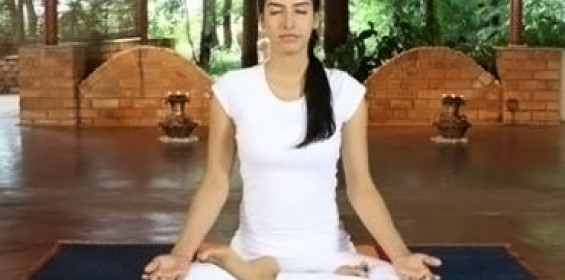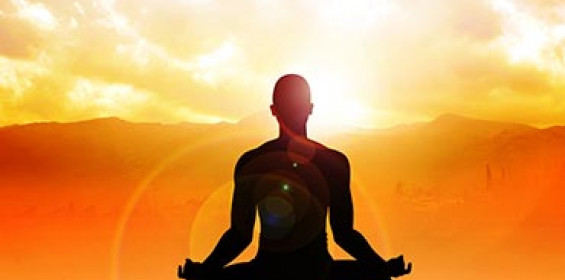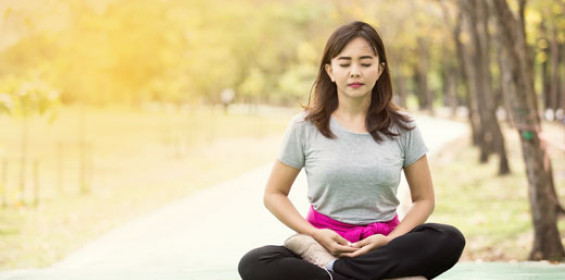Every athlete would agree that energy is a key ingredient to success in sport. Food, restful sleep, breath and meditation are the four sources of energy.
The amount of energy gained from meditation is greater than that from sleep with 20 minutes of meditation equal to 8 hours of deep sleep. Meditation is probably the most powerful technique known to relieve stress and anxiety and restore health. Here are 8 steps to get you started on a meditation program that can support your sport and your life.
#1 Yogic Stretching
Yogic stretching is different from the western concept of exercise and is essential to beginning your meditation because it frees excess energy, allowing the mind to relax with ease.
Take IMPACT Action: Perform 5-10 rounds of posture sequences (learned under the guidance of a trained yoga teacher) such as Sun Salutations (Surya Namaskar) in which each posture is synchronized with the breath.
#2 Pranayam (Yogic Breath)
Pranayam is breath control that noticeably shifts mood and energy and purifies the mind. Importance is given to the breath because the lungs can remove as many as 250 toxins and impurities from the body simply through the regular practice of pranayam.
Take IMPACT Action: Spend 10 minutes performing yogic breathing exercises (learned under the guidance of a teacher); yogic breath has been practiced for thousands of years, and has been shown to improve cardiovascular and respiratory efficiency, and increase concentration, attention and memory.
#3 Create Personal Space
It’s important to create a comfortable, personal space where you sit each day to meditate. Practicing in the same space builds up an uplifting atmospheric vibration; you can surround this space with inspiring images.
Take IMPACT Action: Sit comfortably with your spine erect, on a chair or cross-legged on the floor, whatever is most relaxing for you. Do not lie down. Sit to meditate for 20 minutes, twice daily.
#4 Be Regular With Your Practice
Practice makes perfect. When you practice regularly, you train your mind to associate with that calm, meditative state.
Take IMPACT Action: Do your best to practice at the same time each day, and for the same length of time. If you feel restless, stick with it, observe the restlessness and complete the 20 minutes.
#5 Your Meditation Mantra
“I am nothing, I want nothing, I do nothing”: Meditation can be boring because, for once in your life, you are not wanting to do or think anything. Nor will your meditation work if you sit with the intention of wanting something from your practice.
Take IMPACT Action: Sit with an attitude of gratitude. Thoughts will come and go; don’t try to chase them away or control them — simply observing without any resistance will bring your mind and body much-needed rest and relaxation. Remember, thoughts when observed will naturally dissolve; they are like waves in an ocean, they come and go.
#6 Reduce Caffeine, Alcohol & Processed Foods
The benefits of a good meditation practice are limited if diet and nutrition are not addressed. Caffeine can disrupt sleep and cause anxiety and restlessness, alcohol can impair balance and steadiness and deplete key electrolytes and minerals vital to nerve and muscle co-ordination and processed food is infused with chemicals and preservatives.
Take IMPACT Action: Reduce your intake of caffeine and alcoholic beverages and eat plenty of fresh, unprocessed foods.
#7 Value Your Practice
It is important to honour your meditation practice and give it the same priority you give your daily sports training routine.
Take IMPACT Action: Turn off your cellphone and anything else that might distract you. Be 100 per cent with your meditation, approach it with reverence and do it with awareness.
#8 Don’t Give Up
Even if you aren’t seeing tangible results and start to doubt your practice, don’t give up. You only doubt that which is positive. Harvard researchers discovered people who practice yoga and meditation long-term had far more active disease-fighting genes than those who practiced no form of relaxation. They called this “the relaxation effect.”
Take IMPACT Action: Stick with it. Your meditation practice is benefitting you in countless intangible ways and on many levels (physical, psychological, emotional) — just believe!
Written by ANGELA SAHOTA
First published in IMPACT MAGAZINE























